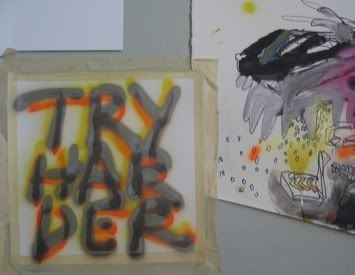How to talk to artists
So you are not an artist. Maybe you are a collector or just someone interested in art. But the problem is that you don't know what to say to an artist. You like their work but how do you start a conversation. Here are some bad and good questions to ask an artist....ARTnews does it's research for you!
First, a few examples of what not to say:
Are you a contemporary artist? All living artists are contemporary.
What movement did you join? Movements are art-historical labels, usually applied in retrospect to artists long departed from the scene. And don’t worry about being able to place an artist in a specific category. “People want to define you and say what you are and what you do,” says Faith Ringgold, who works in a range of media, from quilting to painting to illustrated children’s books. “That’s why I like being an artist—because I get to define who I am and what I do.”
You’re an artist? Oils or acrylic? There are many forms of expression that fall outside the traditional categories of easel painting. A simple “Tell me about your work” is preferable.
Do you own your own gallery? Artists usually do not own galleries; they work in studios. The two are very different.
Do you have any extra pictures you don’t want? Do you ask bankers if they have any extra money they don’t want?
Your work is exactly like so-and-sos. “Do you mean I’m not original? I’m derivative?” worries the artist.
It must be fun to play all the time. When do you actually work? Ouch! This question is universally loathed. Artists understand very well that they’re not coal miners, schoolteachers, or insurance adjusters. But they work very hard—and consider their work to be work, not play.
And the corollary: What do you do for a living? The goal of almost all artists is to make their art pay for itself, though many have to supplement their income in other ways. But making art is what they do for a living.
Do you work at home? Artists hear this question as a kind of test: answer yes and you’re a hobbyist. The places artists work shouldn’t define the quality of their work.
Is this finished? Just assume a work is finished—unless told otherwise. (Remember how you felt as a teenager when your mother would ask, “Is that what you’re wearing tonight?”) Similarly, inquiring about how a piece is displayed can be dangerous. “Is this supposed to be on the floor?” a viewer once asked Polly Apfelbaum, an artist renowned for complex floor installations she calls fallen paintings.
In an informal survey of artists, certain questions were big winners:
Can I see more?
Would we be able to acquire this piece for the Museum of Modern Art?
I love your work. Can I help sponsor and organize a big show for you?
Is this for sale? (Or its variant: Can I pay in cash?)
Can I be your patron (for life)?
First, a few examples of what not to say:
Are you a contemporary artist? All living artists are contemporary.
What movement did you join? Movements are art-historical labels, usually applied in retrospect to artists long departed from the scene. And don’t worry about being able to place an artist in a specific category. “People want to define you and say what you are and what you do,” says Faith Ringgold, who works in a range of media, from quilting to painting to illustrated children’s books. “That’s why I like being an artist—because I get to define who I am and what I do.”
You’re an artist? Oils or acrylic? There are many forms of expression that fall outside the traditional categories of easel painting. A simple “Tell me about your work” is preferable.
Do you own your own gallery? Artists usually do not own galleries; they work in studios. The two are very different.
Do you have any extra pictures you don’t want? Do you ask bankers if they have any extra money they don’t want?
Your work is exactly like so-and-sos. “Do you mean I’m not original? I’m derivative?” worries the artist.
It must be fun to play all the time. When do you actually work? Ouch! This question is universally loathed. Artists understand very well that they’re not coal miners, schoolteachers, or insurance adjusters. But they work very hard—and consider their work to be work, not play.
And the corollary: What do you do for a living? The goal of almost all artists is to make their art pay for itself, though many have to supplement their income in other ways. But making art is what they do for a living.
Do you work at home? Artists hear this question as a kind of test: answer yes and you’re a hobbyist. The places artists work shouldn’t define the quality of their work.
Is this finished? Just assume a work is finished—unless told otherwise. (Remember how you felt as a teenager when your mother would ask, “Is that what you’re wearing tonight?”) Similarly, inquiring about how a piece is displayed can be dangerous. “Is this supposed to be on the floor?” a viewer once asked Polly Apfelbaum, an artist renowned for complex floor installations she calls fallen paintings.
In an informal survey of artists, certain questions were big winners:
Can I see more?
Would we be able to acquire this piece for the Museum of Modern Art?
I love your work. Can I help sponsor and organize a big show for you?
Is this for sale? (Or its variant: Can I pay in cash?)
Can I be your patron (for life)?


0 Comments:
Post a Comment
<< Home